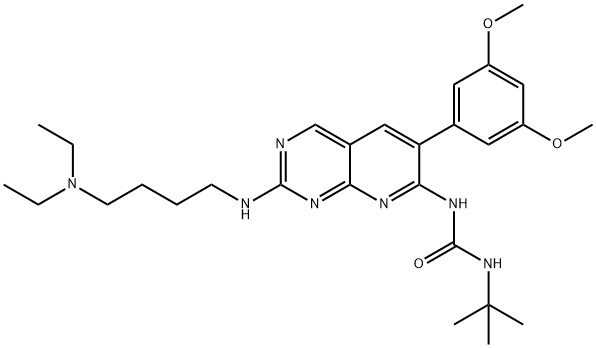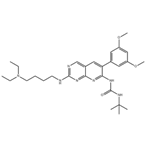Description
PD173074 (219580-11-7) is an inhibitor of FGFR tyrosine kinase, and to a lesser extent VEGFR1?(IC50?values are 5 nM, 22.5 nM and 100 nM for FGFR1, FGFR3 and VEGFR respectively). Inhibition of FGFR by PD173074 promotes stem cell self renewal.2,3
Chemical Properties
Yellow Solid
Uses
PD173074 is a potent FGFR1 inhibitor with IC50 of ~25 nM and also inhibits VEGFR2 with IC50 of 100-200 nM.
Uses
A selective FGFR1 and
Uses
PD 173074
ar signal-related kinase phosphorylation.
Definition
ChEBI: A member of the class of ureas that is 1-tert-butylurea in which one of the hydrogens attached to N3 is substituted by a pyrido[2,3-d]pyrimidin-7-yl group, which is itself substituted at pos
tions 2 and 6 by a 4-(diethylamino)butyl]amino group and a 3,5-dimethoxyphenyl group, respectively. It is a FGF/VEGF receptor tyrosine kinase inhibitor.
Biological Activity
Selective FGFR1 and FGFR3 inhibitor (IC 50 values are 5, 21.5, ~100, 17600 and 19800 nM for FGFR3, FGFR1, VEGFR2, PDGFR and c-Src respectively, and > 50000 nM for EGFR, InsR, MEK and PKC). Inhibits VEGF- and FGF-induced angiogenesis in the mouse cornea model of angiogenesis. Inhibits proliferation and differentiation of oligodendrocyte progenitors.
Biochem/physiol Actions
PD 173074 is a fibroblast growth factor receptor 3 (FGFR3) inhibitor: IC50 = 5 nM inhibition of FGFR3 autophosphorylation. PD 173074 arrests the G0/G1 phase of FGFR3-expressing cells. It is 100-fold more selective for FGFR3 than for VEGF receptors, IGF-1 receptors, and MAPKs.
in vitro
pd173074 was found to block h-510 and h-69 sclc proliferation and clonogenic growth in a dose-dependent fashion and prevent fgf-2-induced chemoresistance as well. these effects correlate with the inhibition of both fgfr1 and fgfr2 transphosphorylation. in addition, pd173074 showed a high degree of selectivity for fgfr tyrosine kinase [2].
in vivo
in the h-510 xenograft mouse model, tumor growth was significanlty improved similar to that seen with single-agent cisplatin administration. accordingly, pd173074 treatment resulted in significanlty prolonged median survival when compared with that of control sham-treated animals. more dramatically, pd173074 also induced complete responses lasting >6 months in 50% of in mice h-69 xenografts [2].
References
[1] RASHMI BANSAL Susan W Suma Magge. Specific inhibitor of FGF receptor signaling: FGF-2-mediated effects on proliferation, differentiation, and MAPK activation are inhibited by PD173074 in oligodendrocyte-lineage cells[J]. Journal of Neuroscience Research, 2003, 74 4: 486-493. DOI:
10.1002/jnr.10773[2] JUNHO KIM Teng M. Regulation of autocrine fibroblast growth factor-2 signaling by perfusion flow in 3D human mesenchymal stem cell constructs[J]. Biotechnology Progress, 2012, 28 5: 1384-1388. DOI:
10.1002/btpr.1604[3] LAURE-EMMANUELLE ZARAGOSI Christian D Ph D Gérard Ailhaud. Autocrine Fibroblast Growth Factor 2 Signaling Is Critical for Self-Renewal of Human Multipotent Adipose-Derived Stem Cells[J]. STEM CELLS, 2009, 24 11: 2412-2419. DOI:
10.1634/stemcells.2006-0006




